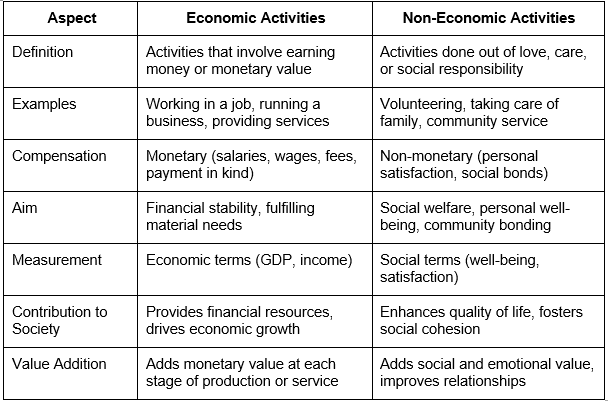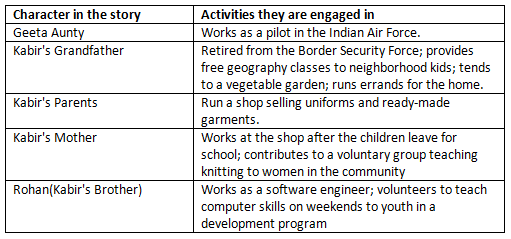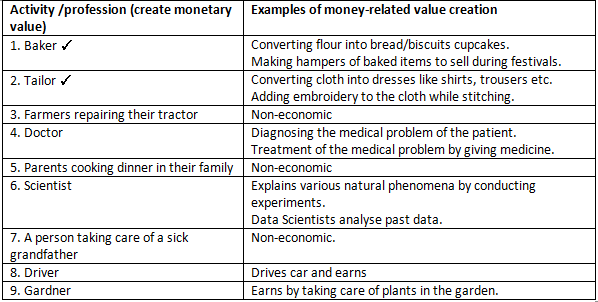The Value of Work NCERT Solutions | Social Studies (SST) Class 6 PDF Download
| Table of contents |

|
| Questions, Activities and Projects |

|
| The Big Questions |

|
| Let's Explore |

|
| Think About It |

|
Questions, Activities and Projects
Q1: How are economic activities different from non-economic activities?
Ans:

Q2: What kind of economic activities do people engage in? Illustrate with examples.
Ans: People engage in various economic activities such as working as a farmer selling produce, a teacher earning a salary, a software engineer developing applications, and a shopkeeper running a retail business. These activities involve earning money and contributing to economic value.
Q3: There is great value attached to people who are engaged in community service activities. Comment on this statement.
Ans: Community service activities are valuable because they contribute significantly to society by improving the lives of others and fostering a sense of solidarity and support. Although these activities may not involve monetary compensation, they create a positive impact, promote social cohesion, and enhance the quality of life.
Q4: What are the various ways in which people are compensated for various economic activities? Give some examples.
Ans: People are compensated for economic activities through salaries (e.g., teachers, office workers), wages (e.g., factory workers, laborers), fees (e.g., doctors, lawyers), and payment in kind (e.g., farm laborers receiving goods like mangoes).
The Big Questions
Q1: What are the different types of activities that people engage in?
Ans: People engage in various types of activities, broadly categorized into economic and non-economic activities. Economic activities involve earning money or monetary value, such as working in a job, running a business, or providing services. Non-economic activities are done out of love, care, or social responsibility, like volunteering, taking care of family members, or community service.
Q2: What is their contribution to our everyday lives?
Ans: Both economic and non-economic activities significantly contribute to our everyday lives. Economic activities provide financial stability and fulfill material needs by generating income and facilitating trade. Non-economic activities enhance social welfare, personal well-being, and community bonding, improving the overall quality of life and fostering a supportive and caring society.
Let's Explore
Page 185
Q: What activities did the people in Anu's and Kabir's story engage in? Mention them in the table given below: Ans:
Ans:
Page 187
Q: In the table given on page 185, did you notice the third empty column? Label this column 'economic / non-economic activity'. Now classify them according to the nature of activity. Ans:
Ans: 
Page 191
Q: Put a ✓ against those activities/professions that you think, create monetary value. Can you add two activities and examples of money related value creation to the empty rows at the end? Ans:
Ans: 
 |
Download the notes
NCERT Solutions: The Value of Work
|
Download as PDF |
Think About It
Page 187
Q1: When Kabir's grandfather voluntarily teaches the neighbourhood kids for free, is that an economic activity or a non-economic activity? How is it different from your teachers teaching you at school? Discuss with your classmates.
Ans: When Kabir’s grandfather voluntarily teaches the neighborhood kids for free, it’s a non-economic activity as this activity does not involve money. Grandfather wishes to contribute to the community by teaching kids in his free time. He is not earning income from this activity.
When a teacher teaches us at school, she is paid a salary for the service rendered by her. Thus, teaching at school involves an exchange of service for money. Therefore it is an economic activity.
Q2: What are some non-economic activities that are important to you and your family? Why are they valuable?
Ans: Many non-economic activities are important in a family. Some of these are parents cooking nutritious meals at home, washing clothes, and maintaining hygiene at home by keeping it clean. Most importantly looking after the physiological and psychological needs of the young and the old in the family.
These activities are very valuable to the family as well as the society. These activities contribute to personal well-being, social cohesion, cultural development, and overall quality of life.
Page 189
Q: On your way from home to school today, can you recall the various economic actimties that people are engaged in? In what ways do you think those people are paid?
Ans: Way from home to school, lots of economic and non-economic activities can be seen:
- Traffic policeman regulating traffic. (Paid salary by the Government)
- Labour working at the construction site. (Paid Daily wages)
- Hawker selling vegetables. (Earns cash or by online payment from the buyer)
- Vendor selling ice-cream. (Earns cash or by online payment from the buyer)
- Shopkeeper selling grocery. (Earns cash or by online payment from the buyer)
Page 193
Q1: Many communities in India have similar practices that involve community participation. Can you identify a few from your area?
Ans: Community participation activities: Meditation or yoga in a park, Celebration of a birthday or a wedding, Attending religious functions, Community kitchens or langars at Gurudwaras, Volunteering for or donating to local schools, resident welfare associations etc.
Q2: We celebrate many festivals in India. During these festivals, people gather to organise all the various activities. They decorate the place together and share the food that they cook. Are these non-economic activities? Why do you think they still hold value?
Ans: Celebrating festivals is a noneconomic activity as it is not done with the motive to earn money. Sharing food, decorating places, and organizing various activities during festivals foster the feeling of oneness, unity, love, respect, and care among people living in a country.
Q3: Can you identify community programmes that have been undertaken by your school or in your locality? What did you observe during these programmes?
Ans: My School has undertaken various community programmes:
- The Environment Club: The environment club is where cleanliness of surroundings is emphasized. Students are taken to clean nearby localities, gardens beaches, rivers, etc.
- The Interact Club: The interact club teaches students about empathy, compassion and selflessness. It urges students to work beyond themselves for society at large and the country as a whole.
|
69 videos|390 docs|80 tests
|
FAQs on The Value of Work NCERT Solutions - Social Studies (SST) Class 6
| 1. How can I improve my back muscles through exercises? |  |
| 2. Is it important to include back exercises in my fitness routine? |  |
| 3. What are some common mistakes to avoid while performing back exercises? |  |
| 4. How often should I do back exercises in a week? |  |
| 5. Can back exercises help alleviate back pain? |  |


















